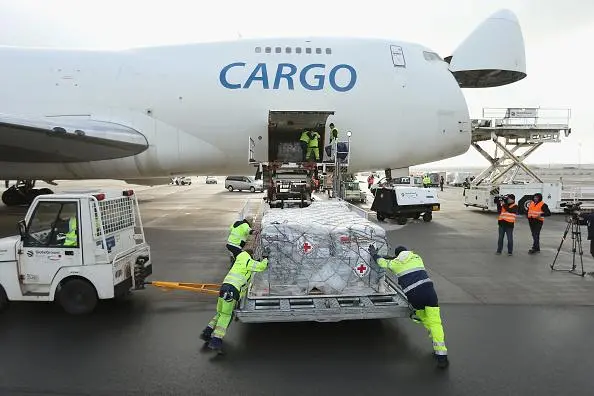PHOTO
The Middle East air freight market, which has been impacted by the loss of belly cargo operations due to the pandemic, has seen a significant improvement following the easing of coronavirus restrictions.
Carriers in the region reported a 25.2 percent decline in cargo demand for May, a significant improvement from the 36.2 percent fall in April, figures released by the International Air Transport Association (IATA) on Tuesday showed.
The region’s air cargo capacity, measured in available cargo tonne-kilometres (ACTKs) also posted the lowest decline worldwide, at 26 percent, compared to 51.6 percent in Latin America and 41.9 percent in Europe.
Airlines worldwide had earlier seen their cargo capacity shrink after governments imposed the world’s strictest lockdown and forced carriers to ground their passenger aircraft. Commercial planes that are used to transport passengers have allotted their belly hold to carry cargo around the world.
In April, shortly after most international borders shut down, global capacity dropped by 34.7 percent. According to IATA, the number eased to 32.2 percent in May, showing a slight improvement.
Despite the overall decline, some airlines had earlier reported seeing increase in demand for freight services, particularly during the height of the lockdown, as consumers in major cities hoarded supplies, fearing shortages, and the healthcare sector required more personal protective equipment (PPE), pharmaceuticals, medical equipment and machinery.
One of the region’s major long-haul operators, Emirates Airlines, has started converting nearly a dozen of its passenger aircraft into mini freighters to accommodate more cargo. Some of the airline’s Boeing 777-300ERs that have been idled by the massive decline in passenger numbers and coronavirus restrictions, have been stripped of Economy seats.
Emirates president Tim Clark had said that the strong demand for air cargo won’t be enough to compensate for the passenger revenue loss. “That’s not going to deal with the loss of passenger income. We’re trying to mitigate the effects of having the whole A380 (fleet) on the ground with all crews in place,” Clark said in webcast early this month.
Alexandre de Juniac, IATA’s director general and CEO, said on Tuesday that the prospects for air cargo remain stronger compared to passenger business. However, he noted that “the future is very uncertain.”
“Economic activity is picking up from April lows as some economies unlock. But predicting the length and depth of the recession remains difficult,” Juniac said.
(Reporting by Cleofe Maceda; editing by Seban Scaria)
#Emirates #Tim Clark #Aviation #COVID-19
Disclaimer: This article is provided for informational purposes only. The content does not provide tax, legal or investment advice or opinion regarding the suitability, value or profitability of any particular security, portfolio or investment strategy. Read our full disclaimer policy here.
© ZAWYA 2020





















